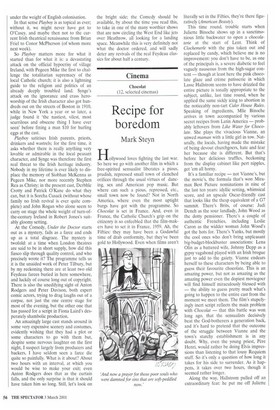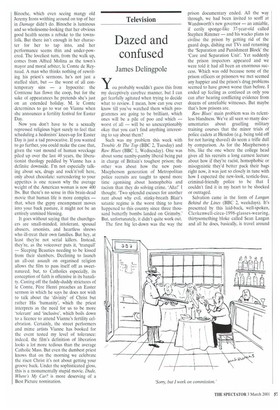Cinema
Chocolat (12, selected cinemas)
Recipe for boredom
Mark Steyn
Hollywood loves fighting the last war. So here we go with another film in which a free-spirited sensualist liberates a pious, prudish, repressed small town of clenched orifices through the usual virtues of dancing, sex and American pop music. But where can such a pious, repressed, etc., small town now be found? Not in North America, where even the most uptight burgs have got with the programme. So Chocolat is set in France. And, even in France, the Catholic Church's grip on the citizenry is so enfeebled that the film-makers have to set it in France, 1959. Ah, the Fifties: they may have been a Godawful time of drab conformity, but they've been gold to Hollywood. Even when films aren't
literally set in the Fifties, they're there figuratively (American Beauty).
This time round, trouble starts when Juliette Binoche shows up in a sanctimonious little backwater to open a chocolaterie at the start of Lent. Think of Clochemerle with the piss taken out and replaced by candy, which believe me is no improvement: you don't have to be, as one of the principals is, a severe diabetic to feel vaguely nauseous from the high-sugar content — though at least here the pink chocolate glaze and creme patisserie in which Lasse Hallstrom seems to have drizzled the entire picture is tonally appropriate to the subject, unlike, last time round, when he applied the same sickly icing to abortion in the noticeably non-tart Cider House Rules. Speaking of ingredients, Mlle Binoche arrives in town accompanied by various secret recipes from Latin America — probably leftovers from Like Water for Chocolate. She plays the vivacious Vianne, an unwed maman with a little girl in tow. Naturally, the locals, having made the mistake of being devout churchgoers, hate and fear her because she is different. But that's before her delicious truffles, beckoning from the display cabinet like pert nipples, get 'em all horny.
It's a familiar recipe — not Vianne's, but the movie's, the formula that's won Miramax Best Picture nominations in nine of the last ten years: idyllic setting, whimsical score, and an upscale Oscar-friendly cast that looks like the thesp equivalent of a G7 summit. There's Brits, of course: Judi Dench as the sour landlady, John Wood as the dotty pensioner. There's a couple of authentic Frenchies, including Leslie Caron as the widder woman John Wood's got the hots for. There's Yanks, but mostly the cool ones who don't bring unpleasant big-budget-blockbuster associations: Lena Olin as a battered wife, Johnny Depp as a gypsy vagabond played with an Irish brogue just to add to the gaiety. Vianne endears herself to these characters by being able to guess their favourite chocolate. This is an amazing power, but not as amazing as the amazing power even the dopiest moviegoer will find himself miraculously blessed with — the ability to guess pretty much what's going to happen to the entire cast from the moment we meet them. The film's stupefyingly inert script reflects the main problem with Chocolat — that this battle was won long ago, that the sensualists decisively beat the God-botherers a generation back, and it's hard to pretend that the outcome of the struggle between Vianne and the town's starchy establishment is in any doubt. Why, even the young priest, Pere Henri, would rather be doing Elvis impressions than listening to that lousy Requiem stuff. So it's only a question of how long it takes for his side to surrender. As it happens, it takes over two hours, though it seemed rather longer.
Along the way, Hallstrom pulled off an extraordinary feat: he put me off Juliette Binoche, which even seeing mangy old Jeremy Irons writhing around on top of her in Damage didn't do. Binoche is luminous and so wholesome-looking that her obvious good health seems a rebuke to the townsfolk. But there isn't enough in her character for her to tap into, and her performance seems thin and under-powered. The loveliest turn, from the walk up, comes from Alfred Molina as the town's mayor and moral arbiter, le Comte de Reynaud. A man who thinks nothing of rewriting his priest's sermons, he's not just a stuffed shirt, but — the worst of all contemporary sins — a hypocrite: the Comtesse has flown the coop, but for the sake of appearances he pretends she's just on an extended holiday. M. le Comte determines to go to war on Vianne when she announces a fertility festival for Easter Day.
Now you don't have to be a sexually repressed religious bigot surely to feel that scheduling a hedonists' knees-up for Easter Day is just a tad provocative. If you wanted to go further, you could make the case that, given the vast mound of human wreckage piled up over the last 40 years, the liberationist theology peddled by Vianne has a definite downside. I'm not especially talking about sex, drugs and rock'n'roll here, only about chocolate: surrendering to your appetites is one reason why the average weight of the American woman is now 400 lbs. But there's no sense in this brain-dead movie that human life is more complex — that, when the gypsy encampment moves into your back pasture, it might not be an entirely unmixed blessing.
It goes without saying that the churchgoers are small-minded, intolerant, spousal abusers, arsonists, and heartless shrews who ill-treat their own families. But hey, at least they're not serial killers, Instead, they're, as the voiceover puts it, 'tranquil' — Sleeping Beauties needing to be kissed from their slumbers. Declining to launch an all-out assault on organised religion allows the film to pass itself off as sweetnatured, but, to Catholics especially, its conception of faith is offensive in its banality. Casting off the fuddy-duddy strictures of le Comte, Pere Henri preaches an Easter sermon in which he says he does not wish to talk about the 'divinity' of Christ but rather His `humanity', which the priest interprets as the need for us to be more 'tolerant' and 'inclusive', which boils down to a licence to attend Vianne's fertility celebration. Certainly, the street performers and mime artists Vianne has booked for the event tested my level of tolerance: indeed, the film's definition of liberation looks a lot more tedious than the average Catholic Mass. But even the dumbest priest knows that on the morning we celebrate the risen Christ it's not about getting your groove back. Under the sophisticated gloss, this is a monumentally stupid movie, Dude, Where's My Car? is more deserving of a Best Picture nomination.













































































 Previous page
Previous page